人教版八年级英语下册教案
(完整版)英语人教版八年级下册英语教学设计
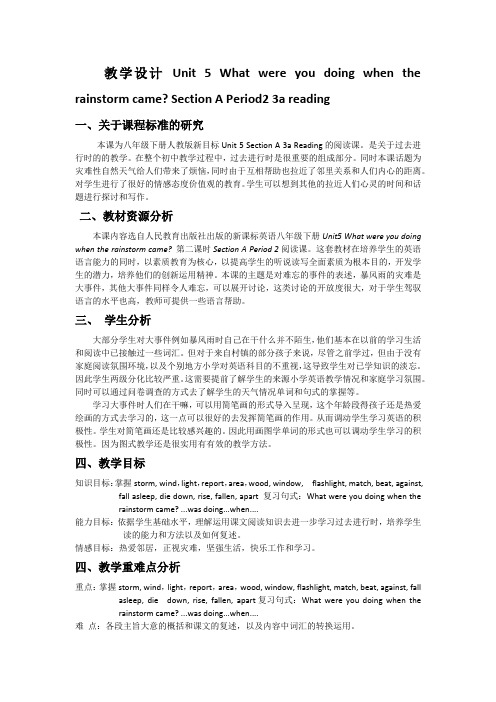
教学设计Unit 5 What were you doing when the rainstorm came? Section A Period2 3a reading一、关于课程标准的研究本课为八年级下册人教版新目标Unit 5 Section A 3a Reading的阅读课。
是关于过去进行时的的教学。
在整个初中教学过程中,过去进行时是很重要的组成部分。
同时本课话题为灾难性自然天气给人们带来了烦恼,同时由于互相帮助也拉近了邻里关系和人们内心的距离。
对学生进行了很好的情感态度价值观的教育。
学生可以想到其他的拉近人们心灵的时间和话题进行探讨和写作。
二、教材资源分析本课内容选自人民教育出版社出版的新课标英语八年级下册Unit5 What were you doing when the rainstorm came?第二课时Section A Period 2阅读课。
这套教材在培养学生的英语语言能力的同时,以素质教育为核心,以提高学生的听说读写全面素质为根本目的,开发学生的潜力,培养他们的创新运用精神。
本课的主题是对难忘的事件的表述,暴风雨的灾难是大事件,其他大事件同样令人难忘,可以展开讨论,这类讨论的开放度很大,对于学生驾驭语言的水平也高,教师可提供一些语言帮助。
三、学生分析大部分学生对大事件例如暴风雨时自己在干什么并不陌生,他们基本在以前的学习生活和阅读中已接触过一些词汇。
但对于来自村镇的部分孩子来说,尽管之前学过,但由于没有家庭阅读氛围环境,以及个别地方小学对英语科目的不重视,这导致学生对已学知识的淡忘。
因此学生两级分化比较严重。
这需要提前了解学生的来源小学英语教学情况和家庭学习氛围。
同时可以通过问卷调查的方式去了解学生的天气情况单词和句式的掌握等。
学习大事件时人们在干嘛,可以用简笔画的形式导入呈现,这个年龄段得孩子还是热爱绘画的方式去学习的,这一点可以很好的去发挥简笔画的作用。
从而调动学生学习英语的积极性。
八年级下册英语教案(精选7篇)

八年级下册英语教案(精选7篇)八年级下册英语教案篇1教学目标一、知识与技能1. 掌握重点词汇和短语。
2. 通过听力训练来掌握提高学生们综合听说能力。
3. 通过阅读训练来让学生们逐步提高英语阅读能力。
二、过程与方法上网查阅相关资料,反复听力,操练对话。
三、情感态度与价值观能用一般过去时和过去进行时叙述过去的事,特别是重大突发事件。
教学重点通过阅读训练来让学生们逐步提高英语阅读能力。
教学难点阅读训练,来培养学生们的综合阅读能力。
教法导航听、说、读、写四项基本技能相结合。
引导学生进行泛读和精读。
学法导航通过多种形式的运用,培养各种能力。
教学准备图片,多媒体。
教学过程Step 1 GreetingsGreet the students as usual.Step 2 RevisionAsk some students to report their dialogues.Step 3 Presentation1a, Think of a time when you were late for or couldn’t go to an event. What was the event? What was the reason why you were late or couldn’t go? Tell your partner the story. Then ask some students to tell their stories.Step 4 ListeningWhat happened to the girl? Let’s listen.1b, Listen and write short answers to the questions.1. What event happened at the school yesterday?2. Who missed the event?3. Which team won at the event?Play the recording at least twice and give the students enough time to write down their answers. Then ask some students to report their answers.1c, Listen again. Number the events [1-6] in the order they happened.____ Kate saw a dog by the side of the road.____ Kate got to the bus stop.____ Kate called the Animal Helpline.1 Kate left the house.____ Kate waited for someone to walk by.____ Kate realized her bag was still at home.Ask some students to report their answers.Step 5 Speaking1d, Talk about why Kate missed the school basketball competition. Student A begins a sentence with while or when. Student B completes the sentence.A:When she got to the bus stop,Kate …B:When she got to the bus stop,Kate realized that her bag was still at home.A:While she was running back home,…B:While she was running back home,she saw a dog by the side of the road.Encourage the students to make up as many dialogues as possible.Step 6 Presentation2a, Look at the pictures and the title in the passage. What do you think the passage is about?Remind the students to talk about it in pairs. Then ask some students to report their answers.Step 7 Reading2b, Read the passage and answer the questions:1. What are the two events in the passage?2. When did they happen?Ask some students to report their answers.2c Read the passage again. Are the following statements true (T) or false (F),or is the information not given (NG)?___ 1. Everyone in America remembers who killed Dr. King.___ 2. Robert Allen was eating lunch when Dr. King was killed.___ 3. Robert’s parents were shocked to hear the news.___ 4. Kate Smith was watching a movie when a plane hit the World Trade Center.___ 5. Kate didn’t think her friend was telling the truth about the event.Ask some students to report their answers.2d Underline sentences from the passage with similar meanings to the ones below.1. Not everyone will remember who killed him,but they can remember what they were doing when they heard that he got killed.2. No one said anything for the rest of dinner.3. September 11,2001—— the date alone means something to most people in the US.4. I had trouble thinking clearly after that because I was very afraid.Ask the students to read the passage carefully and try to find out the answers.Step 8 Language points1.My parents did not talk after that,and we finished the rest of our dinner in silence.in silence 沉默,无声e.g. Many patients were waiting in silence. 许多病人在静静地等候着。
新人教版八年级下册英语教学计划10篇

新人教版八年级下册英语教学计划10篇让学生在使用英语中学习英语,让学生成为GoodUser而不仅仅是Learner。
让英语成为学生学习生活中最实用的工具而非累赘,让他们在使用和学习英语的过程中,体味到轻松和成功的快乐,这里给大家分享一些关于新人教版八年级下册英语教学计划10篇,供大家参考。
高中教师教学工作计划八年级下册英语教学计划1一、教学目标培养学生优良的英语学习兴趣、习惯,帮助学生树立自信心,养成良好的英语学习习惯,提高、发展自主学习的能力,形成有效的学习策略;使学生掌握一定的语言基本知识和技能,有较好的语感,获得初步运用英语的能力,为实际应运打下扎实的基础。
同时注重综合能力的开发、提高,培养他们的观察、思维、记忆、想象和创造等方面的能力;让学生了解中西方文化的差异,培养爱国主义精神,增强世界观意识,并结合课外学习,达到教学的秀性,培养学生良好的自学能力和习惯,并做到持之以恒,使本年段的英语教学能进一步发展、提高。
在这一学期中,主要培养学生学习英语的兴趣,继续培养学习英语的学习习惯,要很好地完成本学期的教学学习任务,重视阅读能力的培养,在实际教育工作中把做好学生思想工作放在学科教育的首位,通过师生的共同努力,为学科和学生本人再创佳绩。
二、教材分析八年级英语是教育出版社出版的新人教版英语,教材编排有以下目的:1.要使学生受到听、说、读、写、英语的训练,掌握最基础的语言知识和语言技能以及培养初步援用英语交际的能力;养成良好的外语学习习惯,掌握学习外语的基本方法;为进一步学习和运用英语打下扎实的基础。
2.使学生明确学习英语的目的性,3.培养初步运用英语交际的能力和自学能力。
三、教材重点、难点本册教材从语音、词汇、语法、阅读等方面着手1、语音教学本册课本在上册的基础上进一步学习和运用音标和单词的发音规则,着重抓好学生的预习,自学能力。
2、词汇教学本册课本所要学习、掌握的单词约400个,另有固定搭配和习惯用语若干条,任务较重。
人教版八年级英语下册教学计划(10篇)

人教版八年级英语下册教学计划(10篇)八年级英语下册教学计划 1一、指导思想以“英语课程标准”为宗旨,适应新课程改革的需要,面向全体学生,提高学生的人文素养,增强实践能力和创新精神。
正确把握英语学科特点,积极倡导合作探究的学习方式。
培养学生积极地情感态度和正确的人生价值观,提高学生综合素质为学生全面发展和终身发展奠定基础。
二、全期教学总目标学生应有较明确的英语学习动机和积极主动的学习态度。
能听懂教师对有关熟悉话题的陈述并能参与讨论。
能读供七至八年级学生阅读的简单读物和报纸杂志,克服生词障碍,理解大意。
能根据阅读目的运用适当的阅读策略。
能与他人合作,解决问题并报告结果,共同完成学习任务。
能在学习中互相帮助,克服困难。
能合理计划和安排学习任务,积极探索适合自己的学习方法。
在学习和日常交际中能注意到中外文化的差异。
三、教材简要分析《新目标英语》八年级(下册),全书共有十个单元,另两个复习单元。
本教材各单元话题灵活,贴近生活实际。
本册书将学习的一些语法知识点有:一般将来时、过去进行时、现在完成时、间接引语、时间状语从句、条件状语从句、反意疑问句等。
同时每个单元后都提供了一篇阅读文章,用以训练学生的阅读能力,扩大学生的阅读量。
四、学情简要分析八年级共有四个教学班,通过初一年半的英语学习,大多数学生已能听懂有关熟悉话题的语段和简短的故事。
能与教师或同学就熟悉的话题交换信息。
能读懂短篇故事,能写便条和简单的书信。
但由于各种因素的.影响,学生发展参差不齐。
有少数学生因为基础不够好,学习很吃力。
五、提高教学质量的可行措施及教改措施1、面向全体学生,注重素质教育。
2、以学生为主体,尊重学生个体差异。
3、采用活动途径,倡导体验与参与。
4、开发课程资源,拓展学用渠道。
具体来说:1.认真专研教材和课标,精心备课,认真上好每一堂课。
确定每堂课的基础内容,预备内容和拓展内容,满足不同层次学生的不同需求。
2.充分利用现有的现代化教学设备,加强直观教学,提高课堂效率。
人教版英语八年级下册教案

人教版英语八年级下册教案(总12页)--本页仅作为文档封面,使用时请直接删除即可----内页可以根据需求调整合适字体及大小--Unit1 What’s the matterSection A1. What’ s the matter怎么啦出什么事情了【解析】matter/ ' mætə(r)) /n.问题;事情What’ s the matter with you?= What’s the trouble with you?= What’ s wrong with you?你怎么了?【注】:matter 和trouble 为名词,其前可加the 或形容词性物主代词, wrong 是adj. 不能加the—What’s the matter ______ Tom. He is wet through.—His car ran _______ the river.; in ; into ; into【用法】用于询问某人有什么病或某人遇到什么麻烦、问题其后跟询问对象时,与介词with连用。
即:What’s the matter with sb.= What’s your trouble?= What’s up= What happens to sb.()What’s ____ with you?A. troubleB. the matterC. the wrongD. matter ()— ______— Nothing serious , but a bit tired.—Better have a rest now, dear.A. Is that allB. Is there anything elseC. What’s thisD. What’s the matter with you()—_________— I have a headache and I don’t feel like eating anything.A. How are youB. What can I do for youC. What’s the matter with youD. How do you like it ()—What’s the matter with Tina?—_______________.A. She is away.B. She is cool.C. She has a sore throat.D. She should take some medicine【拓展】matter的用法(1) It doesn’t matter 没关系(用来回答别人道歉时的用语)(2) as a matter of fact= in fact 事实上, 实际上2. I have a cold 我感冒了I have a stomachache 我患胃痛I have a sore back. 我背痛。
人教版八年级下册英语说课稿
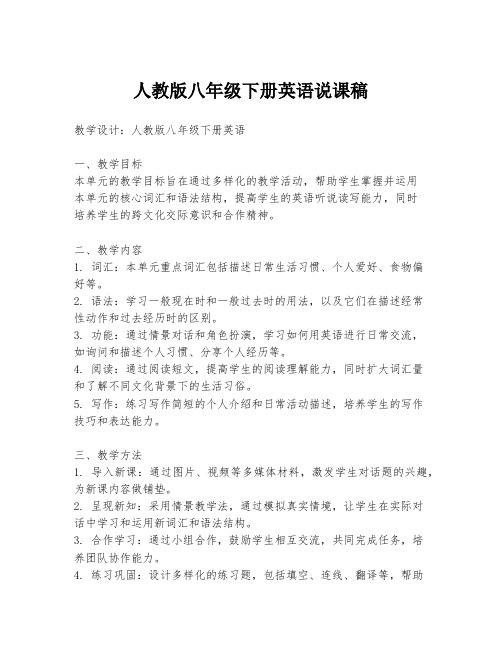
人教版八年级下册英语说课稿教学设计:人教版八年级下册英语一、教学目标本单元的教学目标旨在通过多样化的教学活动,帮助学生掌握并运用本单元的核心词汇和语法结构,提高学生的英语听说读写能力,同时培养学生的跨文化交际意识和合作精神。
二、教学内容1. 词汇:本单元重点词汇包括描述日常生活习惯、个人爱好、食物偏好等。
2. 语法:学习一般现在时和一般过去时的用法,以及它们在描述经常性动作和过去经历时的区别。
3. 功能:通过情景对话和角色扮演,学习如何用英语进行日常交流,如询问和描述个人习惯、分享个人经历等。
4. 阅读:通过阅读短文,提高学生的阅读理解能力,同时扩大词汇量和了解不同文化背景下的生活习俗。
5. 写作:练习写作简短的个人介绍和日常活动描述,培养学生的写作技巧和表达能力。
三、教学方法1. 导入新课:通过图片、视频等多媒体材料,激发学生对话题的兴趣,为新课内容做铺垫。
2. 呈现新知:采用情景教学法,通过模拟真实情境,让学生在实际对话中学习和运用新词汇和语法结构。
3. 合作学习:通过小组合作,鼓励学生相互交流,共同完成任务,培养团队协作能力。
4. 练习巩固:设计多样化的练习题,包括填空、连线、翻译等,帮助学生巩固所学知识。
5. 反馈评价:通过课堂小测验和作业检查,及时了解学生的学习情况,给予适当的反馈和指导。
四、教学过程1. 热身活动(5分钟)- 通过播放与日常生活相关的图片或视频,引导学生讨论自己的日常习惯和喜好。
2. 新课呈现(15分钟)- 教师介绍本单元的核心词汇和语法点,通过情景对话的方式,让学生在实际语境中学习和运用。
3. 合作探究(20分钟)- 分组活动,让学生通过角色扮演、信息差等方式,练习用英语交流和描述个人习惯和经历。
4. 练习巩固(15分钟)- 设计相关的练习题,让学生独立完成,然后小组内讨论答案,教师巡视指导。
5. 阅读拓展(10分钟)- 阅读一篇与单元主题相关的短文,让学生了解不同文化背景下的生活习俗,并回答相关问题。
人教版八年级下册英语教学设计含教学反思

人教版八年级下册英语教学设计含教学反思全文共10篇示例,供读者参考篇1Title: My English Lesson Design - Going Back to Primary School!Hello everyone! Today, I want to share with you a lesson plan that I created for my eighth-grade English class. It's inspired by the way we used to learn English in elementary school, with lots of fun activities and games. Let's jump right in!1. Warm-up (10 minutes):To start off the lesson, I would play a quick round of the classic game "Simon Says" with the students. This will get them excited and ready to learn.2. Vocabulary Practice (20 minutes):Next, I would introduce a new set of vocabulary words using flashcards. I'll make it more engaging by having the students guess the meaning of each word based on the pictures on the flashcards.3. Reading Comprehension (30 minutes):For the reading activity, I will choose a short story that is both interesting and age-appropriate. After reading the story together as a class, I will ask comprehension questions to check their understanding.4. Speaking Practice (15 minutes):To improve their speaking skills, I will divide the students into pairs and give them a topic to discuss. This can be something simple like their favorite hobby or a recent vacation. I will encourage them to use the vocabulary words they learned earlier in the lesson.5. Grammar Review (20 minutes):For the grammar portion of the lesson, I will review some basic grammar rules such as verb tenses or sentence structure. I will make it more interactive by incorporating a grammar game like "Grammar Bingo" or "Grammar Jeopardy".6. Writing Practice (25 minutes):To wrap up the lesson, I will have the students write a short paragraph using the vocabulary words, grammar rules, and ideas they learned throughout the lesson. I will provide feedback and corrections to help them improve their writing skills.7. Closing (5 minutes):To end the lesson on a positive note, I will have a quick review of what we learned and ask the students to share their favorite part of the lesson.Overall, I believe that incorporating elements of primary school teaching into my eighth-grade English lessons will make the learning experience more enjoyable and effective for my students. I will also ask my students for feedback to see what they thought of the lesson and make adjustments for future lessons. I hope you enjoyed reading about my lesson plan and maybe even try it out in your own classroom. Thank you for listening!篇2Hello everyone! Today I want to share with you my English teaching plan for the eighth grade students.First, I will start the class with a warm-up activity to get our brains thinking in English. We can play a game like "Simon Says" or do a quick vocabulary review. This will help us get focused and ready to learn.Next, I will introduce the new lesson for the day. We will be learning about different types of transportation and how to talkabout them in English. I will use pictures, videos, and real-life examples to make the lesson more interesting and engaging.After that, we will do some practice exercises together as a class. We will work on speaking, listening, reading, and writing skills to make sure we understand the new material. I will also encourage students to work in pairs or small groups to practice using the new vocabulary and grammar structures.To wrap up the lesson, we will play a fun review game to test our knowledge and have some friendly competition. This will help reinforce what we have learned and keep us engaged until the end of the class.After the lesson, I will take some time to reflect on how the class went. Did the students understand the material? Were they engaged and participating? What could I do better next time? By reflecting on my teaching, I can continue to improve and provide the best learning experience for my students.Overall, I want my students to have fun while learning English and feel confident in their abilities. I hope this lesson plan will help them become more comfortable using English in their daily lives. Thank you for listening and I can't wait to see you all in our next class!篇3Hey guys, today I want to talk about a super cool lesson plan for our English class in 8th grade using the People's Education Press textbook. Let's get started!First, let's start with a warm-up activity to get our brains ready to learn. We can do a quick vocabulary quiz to review some of the words we've learned in previous lessons. This will help us remember and use the new words in today's lesson.Next, we can move on to the main part of the lesson. Today, we will be learning about different types of hobbies and how to talk about them in English. We can start by watching a short video or listening to a dialogue about hobbies. Then, we can practice speaking and writing about our own hobbies with a partner or in small groups.After that, let's do a fun activity to reinforce what we've learned. We can play a game like charades where we act out different hobbies and the rest of the class has to guess what it is. This will help us remember the vocabulary and practice our speaking skills.Finally, we can end the lesson with a reflection activity where we think about what we've learned and how we can use it in ourdaily lives. This will help us see the practical value of learning English and motivate us to keep improving.Overall, I think this lesson plan will be super fun and engaging for all of us. I can't wait to learn more about hobbies and practice speaking English with my friends. Let's make this the best English lesson ever!After the lesson, the teacher can reflect on what went well and what could be improved for future lessons. This will help them continue to improve their teaching skills and provide the best learning experience for their students. Let's keep learning and growing together!篇4Hey guys, it's time to talk about our English lesson today! We are going to learn about the lesson plan for the 8th grade in the People's Education Edition (PEP) of the textbook. The lesson is about designing an English teaching plan and reflecting on the teaching practice.In the beginning, we will introduce the objectives of the lesson, which are to understand the importance of lesson planning in English teaching and to reflect on the teaching strategies used in the classroom.Next, we will discuss the key points of the lesson, such as how to set clear goals for the lesson, how to choose appropriate teaching materials, and how to engage students in active learning activities.Then, we will move on to the teaching procedures, which include warm-up activities, vocabulary practice, grammar explanation, listening and speaking practice, reading comprehension, and writing exercises.After that, we will talk about the assessment methods used in the lesson, such as quizzes, tests, homework assignments, and peer evaluations.Finally, we will reflect on the teaching practice, discussing what worked well in the lesson, what could be improved, and how to make adjustments for future lessons.In conclusion, designing an English teaching plan is crucial for effective teaching, and reflecting on our teaching practice helps us improve as English teachers. Let's keep learning and growing together!篇5Title: My English Class DesignHello everyone! Today I want to share with you all about my English class design. Our textbook is from the People’s Education Press, Grade 8, 2nd semester.First, let me tell you about my warm-up activity. I like to start my class with a fun game like "Simon Says" or a quick quiz about the previous lesson. It helps us get focused and ready to learn!Next, we move on to the new lesson. I like to introduce new vocabulary with pictures and real-life examples. For grammar rules, I try to make it simple and easy to understand. I often use songs, videos, or even role-playing activities to make it more interesting.After that, we do some exercises together. I like to mix it up with individual work, group work, and class discussions. This way, everyone gets involved and can learn from each other.To wrap up the lesson, we do a quick review of what we’ve learned. I ask some questions to check everyone’s understanding. If there’s time, we play a review game like "Hangman" or "Jeopardy" to make it more fun.Finally, I always ask for feedback from my students. I want to know what they liked, what they didn’t like, and what they wantto learn more about. It helps me improve my teaching and make the class better for everyone.In conclusion, teaching English is not just about grammar and vocabulary. It’s also about making it engaging, fun, and relevant to our daily lives. I hope you all enjoyed learning about my English class design. Thank you for listening!篇6Hi guys,Today I want to share with you my English teaching plan for the eighth grade. This lesson is about giving directions, which can be a little tricky, but I have some fun activities planned for you to make it easier to learn.First, I will start the lesson by showing you some pictures of different places in a city, like a park, a school, and a hospital. We will talk about where these places are located and how we can get there. Then, I will teach you some key vocabulary words related to giving directions, such as "turn left," "go straight," and "cross the street."Next, we will do a role-playing activity where you will pretend to be lost in the city and have to ask for directions fromyour classmates. This will help you practice using the vocabulary in a real-life situation. After that, we will watch a short video clip of people giving directions in English, so you can hear how it sounds in a natural conversation.To finish the lesson, I will give you a worksheet to complete, where you will have to follow a map and write down directions to different places. This will help you practice reading and writing directions in English. At the end of the lesson, we will review what we have learned and I will give you some homework to do for next time.Overall, I hope this lesson will help you feel more confident in giving directions in English. If you have any questions or feedback, feel free to let me know. Keep up the good work, and I'll see you next time!Reflection:In retrospect, I think the lesson went well overall. The students were engaged and participated actively in the activities. However, I noticed that some students struggled with pronouncing the vocabulary words correctly, so I need to spend more time on pronunciation in future lessons. Additionally, I could have provided more opportunities for students to practice speaking and listening in pairs or small groups. Overall, I amhappy with how the lesson went and look forward to planning more engaging activities for future lessons.篇7Hello everyone! Today I'm going to share with you about a lesson plan for the eighth grade English class.First, I started the class by reviewing the previous lesson on vocabulary words. I used flashcards and encouraged students to work in pairs to quiz each other. This helped them remember the words better and also improved their speaking and listening skills.Next, I introduced a new grammar concept - present perfect tense. I used examples and pictures to explain the concept clearly to the students. We practiced forming sentences in present perfect tense with different verbs. I also gave them a worksheet to complete in pairs, which helped them apply what they had learned.After that, we moved on to the reading comprehension activity. I divided the class into small groups and gave each group a short passage to read and discuss. They had to answer questions about the passage and present their answers to the class. This activity not only improved their reading andcomprehension skills but also encouraged teamwork and communication.To wrap up the lesson, I had a fun speaking activity where students had to talk about their past experiences using the present perfect tense. They enjoyed sharing their stories with each other and practicing the grammar concept in a real-life context.Overall, the lesson went well and the students were engaged and participated actively throughout the class. However, I realized that I could have incorporated more opportunities for students to practice speaking individually. This is something I will focus on for future lessons.In conclusion, the lesson was successful in helping students understand and practice the present perfect tense. I will continue to refine my teaching techniques to create a more interactive and engaging learning environment for my students. Thank you for reading my reflection on this lesson!篇8Hello everyone! Today I'm going to tell you about my English teaching plan for the eighth grade students in the People's Education Edition.First, I will start the class with a warm-up game to get everyone excited and ready to learn. We will play a fun vocabulary game where students have to guess the word based on the clues given. This will help review their previous knowledge and activate their English skills.Next, I will introduce the new grammar points and vocabulary for the lesson. I will use interactive activities such as word puzzles, group discussions, and role-playing to help students understand and remember the new material. I will also include real-life examples and situations to make the learning experience more engaging and relevant.After teaching the new material, I will give the students some practice exercises to reinforce their understanding. This could be in the form of worksheets, quizzes, or even a mini-project where they have to apply what they have learned in a creative way.To wrap up the lesson, I will have a quick review session where students can ask questions and clarify any doubts they may have. I will also assign homework that will further reinforce their learning and help them practice on their own.In the reflection part, I will analyze the effectiveness of my teaching methods and activities. I will consider things like student engagement, understanding of the material, and overallclass participation. Based on this reflection, I will make adjustments and improvements for future lessons.Overall, I aim to create a dynamic and interactive English learning environment for my eighth grade students. By incorporating various teaching strategies and activities, I hope to inspire a love for the English language and encourage students to continue learning and improving their skills. Thank you for listening, and I look forward to our next class together!篇9Hello everyone! Today I'm going to share with you my English teaching plan for the eighth grade textbook "People's Education Press".Firstly, I will start the class by reviewing the previous lesson. I will ask some questions to check the students' understanding and encourage them to participate actively.Next, I will introduce the new lesson by using real-life examples and interesting stories to make the lesson more engaging and easier to understand. I will also use multimedia tools such as videos and pictures to make the lesson more visual and interactive.During the lesson, I will organize various activities such as group discussions, role-playing, and games to help students practice and apply the new knowledge. I will also provide guidance and support to ensure that every student can actively participate and learn effectively.At the end of the lesson, I will summarize the key points and give students some exercises to reinforce their learning. I will also encourage students to ask questions and give feedback to improve their understanding.After the class, I will reflect on the teaching process and student performance to identify areas for improvement. I will also seek feedback from students to understand their learning experience and make adjustments for future lessons.In conclusion, with careful preparation, creative teaching methods, and continuous improvement, I believe my English teaching plan will help students learn effectively and enjoy the learning process. Thank you for listening!篇10Title: Fun English Lesson Plan for Grade 8 (Unit X)Hi guys! Today I'm gonna share with you my super fun English lesson plan for Grade 8. We're gonna have a blast learning English together!Lesson Objectives:1. To improve students' vocabulary related to daily routines2. To practice using present simple tense in sentences3. To enhance students' speaking and listening skills through interactive activitiesMaterials Needed:1. Flashcards with pictures of daily routines2. Worksheets with fill-in-the-blank sentences3. Whiteboard and markers4. Timer for timing activities5. Fun English songs related to daily routinesWarm-up (5 minutes):Start the lesson by singing a fun English song about daily routines. Encourage students to sing along and follow the actions in the song.Introduction (10 minutes):Introduce the vocabulary related to daily routines using flashcards. Have students repeat after you and practice saying the words aloud.Practice (15 minutes):Divide the class into pairs and give each pair a worksheet with fill-in-the-blank sentences using present simple tense. Students will work together to fill in the blanks and then share their answers with the class.Interactive Activity (20 minutes):Play a game where students have to act out different daily routines for their classmates to guess. This will help reinforce the vocabulary and provide extra speaking practice.Closure (5 minutes):Review the key points of the lesson and ask students to share one thing they learned today.Reflection:Overall, the lesson went really well. The students were engaged and participated actively in the activities. However, I would like to incorporate more group work in future lessons toencourage collaboration among students. Additionally, I will provide more opportunities for students to practice speaking English in a natural and interactive way. Can't wait for our next English class together!。
新版人教版八年级英语下册全册教案
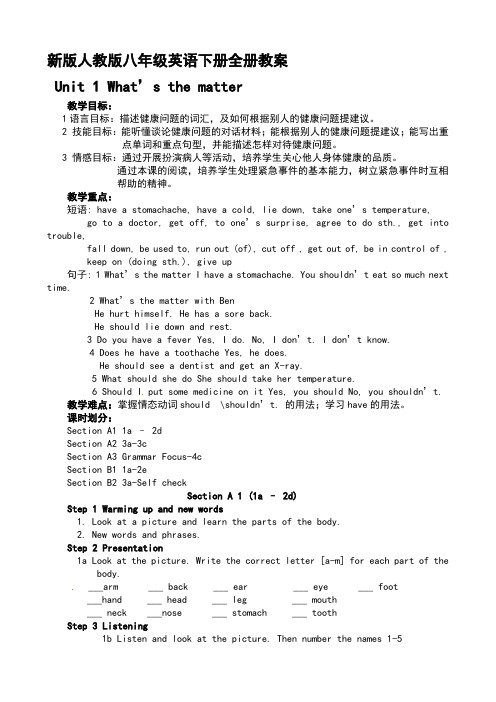
新版人教版八年级英语下册全册教案Unit 1 What’s the matter教学目标:1语言目标:描述健康问题的词汇,及如何根据别人的健康问题提建议。
2 技能目标:能听懂谈论健康问题的对话材料;能根据别人的健康问题提建议;能写出重点单词和重点句型,并能描述怎样对待健康问题。
3 情感目标:通过开展扮演病人等活动,培养学生关心他人身体健康的品质。
通过本课的阅读,培养学生处理紧急事件的基本能力,树立紧急事件时互相帮助的精神。
教学重点:短语: have a stoma chache, have a cold, lie down, take one’s temperature, go to a doctor, get off, to one’s surprise, agree to do sth., get into trouble,fall down, be used to, run out (of), cut off , get out of, be in control of , keep on (doing sth.), give up句子: 1 What’s the matter I have a stomachache. You shouldn’t eat so much next time.2 What’s the matter with BenHe hurt himself. He has a sore back.He should lie down and rest.3 Do you have a fever Yes, I do. No, I don’t. I don’t know.4 Does he have a toothache Yes, he does.He should see a dentist and get an X-ray.5 What should she do She should take her temperature.6 Should I put some medicine on it Yes, you should No, you shouldn’t.教学难点:掌握情态动词should \shouldn’t. 的用法;学习have的用法。
人教版八年级英语下册教案7篇
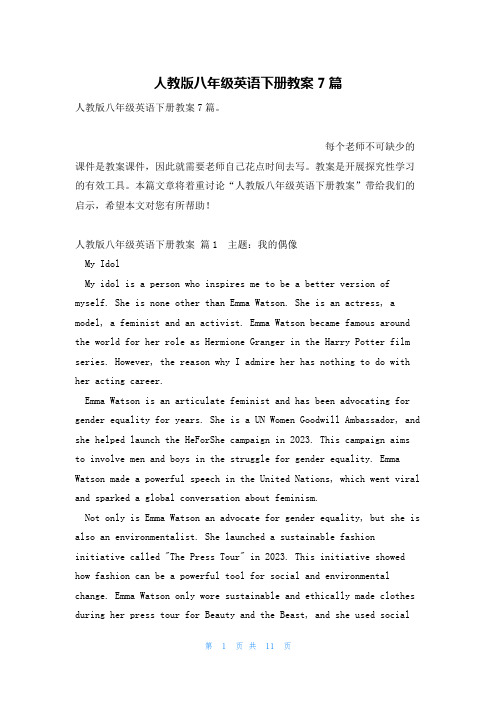
人教版八年级英语下册教案7篇人教版八年级英语下册教案7篇。
每个老师不可缺少的课件是教案课件,因此就需要老师自己花点时间去写。
教案是开展探究性学习的有效工具。
本篇文章将着重讨论“人教版八年级英语下册教案”带给我们的启示,希望本文对您有所帮助!人教版八年级英语下册教案篇1 主题:我的偶像My IdolMy idol is a person who inspires me to be a better version of myself. She is none other than Emma Watson. She is an actress, a model, a feminist and an activist. Emma Watson became famous around the world for her role as Hermione Granger in the Harry Potter film series. However, the reason why I admire her has nothing to do with her acting career.Emma Watson is an articulate feminist and has been advocating for gender equality for years. She is a UN Women Goodwill Ambassador, and she helped launch the HeForShe campaign in 2023. This campaign aims to involve men and boys in the struggle for gender equality. Emma Watson made a powerful speech in the United Nations, which went viral and sparked a global conversation about feminism.Not only is Emma Watson an advocate for gender equality, but she is also an environmentalist. She launched a sustainable fashioninitiative called "The Press Tour" in 2023. This initiative showed how fashion can be a powerful tool for social and environmental change. Emma Watson only wore sustainable and ethically made clothes during her press tour for Beauty and the Beast, and she used socialmedia to raise awareness about the importance of ethical fashion.Emma Watson's activism inspires me to take action myself. She proves that celebrities can use their platform for good, and I hope to follow in her footsteps. She is not only beautiful on the outside, but she is also beautiful on the inside. She is intelligent, confident, and compassionate. She is everything I aspire to be, and I am lucky to have her as my idol.人教版八年级英语下册教案篇2 I'm sorry, as an AI language model,I'm not able to access the specific "人教版八年级下册英语课件" you are referring to. However, I can provide you with a general theme for an 8th-grade English class presentation that you may be able to use as a basis for your own writing.Topic: TravelingTraveling is a common hobby among people of all ages and backgrounds. It allows us to see new places, experience different cultures, meet new people, and learn about the world outside of our own. In this presentation, we will explore various aspects of traveling, including its benefits, challenges, and different ways to approach it.Benefits of TravelingThere are many benefits to traveling, including:1. Personal growth: Traveling can help you develop new skills, learn about different cultures and perspectives, and become more confident and independent.2. Health benefits: Traveling can help reduce stress, improve mental health, and promote physical activity.3. Cultural enrichment: Traveling can expose you to new customs, foods, languages, and art, which can broaden your horizons andenhance your appreciation for diversity.Challenges of TravelingAlthough traveling can be fun and exciting, it also comes with its own set of challenges, such as:1. Cost: Traveling can be expensive, especially if you want tovisit far-off destinations or stay in luxury accommodations.2. Safety: Depending on where you travel, there may be safety risks to consider, such as political unrest, crime, or natural disasters.3. Logistics: Planning and executing a trip can be time-consuming and stressful, as you need to arrange transportation, accommodations, and activities.Approaches to TravelingThere are many different ways to approach traveling, depending on your preferences and goals. Some popular approaches include:1. Adventure travel: This involves activities like hiking, camping, climbing, or other outdoor activities that require physical challenges and risk-taking.2. Cultural immersion: This approach involves spending time inlocal communities, learning about their customs and traditions, and trying local foods and activities.3. Relaxation travel: This involves choosing destinations where you can unwind and recharge, such as beach resorts, spas, or quiet countryside retreats.ConclusionTraveling can be an enriching and transformative experience that allows us to learn more about ourselves and the world. By exploring the benefits, challenges, and different approaches to traveling, we can better understand how to make the most of our journeys and createmeaningful memories that will last a lifetime.人教版八年级英语下册教案篇3 Sorry, as an AI language model, I cannot provide plagiarised or pre-written content. However, I can give you a generic outline to write your essay:Topic: My experience with learning English using "人教版八年级下册英语课件"Introduction:- Introduce the topic and explain why you chose it.- Briefly mention the importance of learning English in today's world.- Explain what "人教版八年级下册英语课件" is and how it helped you learn English.Body:- Discuss the various aspects of the "人教版八年级下册英语课件" that helped you learn English, such as the content, exercises, audio-visual aids, etc.- Give examples of specific lessons or topics that you found particularly useful or interesting.- Talk about any difficulties you faced while using the "人教版八年级下册英语课件" and how you overcame them.- Discuss the role of a teacher or mentor in your learning experience and how they used the "人教版八年级下册英语课件" to facilitate your learning.- Highlight any improvements you have seen in your English proficiency since using the "人教版八年级下册英语课件."Conclusion:- Summarize your experience with the "人教版八年级下册英语课件." - Discuss how it has benefited you and how it can benefit otherEnglish learners.- Mention your future goals in learning English and how you plan to achieve them.人教版八年级英语下册教案篇4 一、主题:My Future DreamMy future dream is to become a successful writer. I have always been passionate about writing and expressing myself through words. I want to create stories and characters that can inspire and entertain people all over the world.In order to achieve this dream, I am currently studying English and Literature in school, as well as reading as many books as I can. I also attend writing workshops and conferences where I can learn from seasoned writers and improve my craft.Aside from writing, I also want to use my platform to spread awareness on important issues. I believe that writers have a unique ability to shed light on difficult topics and initiate change.Although the road to becoming a successful writer may be difficult, I am determined to work hard and pursue my passion. I know that with the right mindset, education, and opportunities, my dream can becomea reality.二、主题:My Ideal VacationMy ideal vacation would be a trip to Japan. I have always been fascinated by the country's rich history, unique culture, and stunning natural landscapes.During my trip, I would visit the bustling cities of Tokyo and Osaka, where I can experience the modern and traditional sides of Japan. I would also travel to Kyoto, where I can explore the various temples and shrines that are scattered throughout the area.Aside from visiting the cities, I would also take the time toappreciate Japan's natural beauty. I would hike along the Kumano Kodo Trail, which is known for its scenic routes and historic landmarks. I would also visit the hot springs in Beppu, where I can relax and soak in the therapeutic waters.Of course, no trip to Japan would be complete without trying the local cuisine. I would indulge in sushi, ramen, and other delicious dishes that are unique to the country.Overall, my ideal vacation would be a trip to Japan, where I can immerse myself in the country's culture, history, and natural beauty.三、主题:The Importance of EducationEducation is one of the most important aspects of society. It provides individuals with the knowledge and skills they need to succeed in life, pursue their passions, and make a positive impact on the world.Education also plays a crucial role in promoting social and economic mobility. Through education, individuals can break the cycle of poverty and achieve their goals, regardless of their socioeconomic status.Moreover, education is essential for building a strong and stable society. It promotes critical thinking, creativity, and problem-solving skills, which are necessary for addressing the complex challenges that we face today.However, it is important to recognize that not everyone has equal access to education. There are many individuals and communities around the world who lack the resources and opportunities needed to pursue their educational goals.As such, it is our responsibility as a society to ensure that education is accessible to all. This includes providing adequatefunding for schools, investing in teacher training and support, and implementing policies and programs that promote equal opportunity and diversity.In summary, education is a vital component of society that has a profound impact on individuals, communities, and the world at large. It is up to us to recognize its importance and work towards ensuring that everyone has equal access to quality education.人教版八年级英语下册教案篇5 作为人教版八年级下册的英语教材,这份课件涉及到了许多有趣且具有教育意义的主题。
2024年人教版八年级英语下册教案 4 Why don't yotalk toyourparents
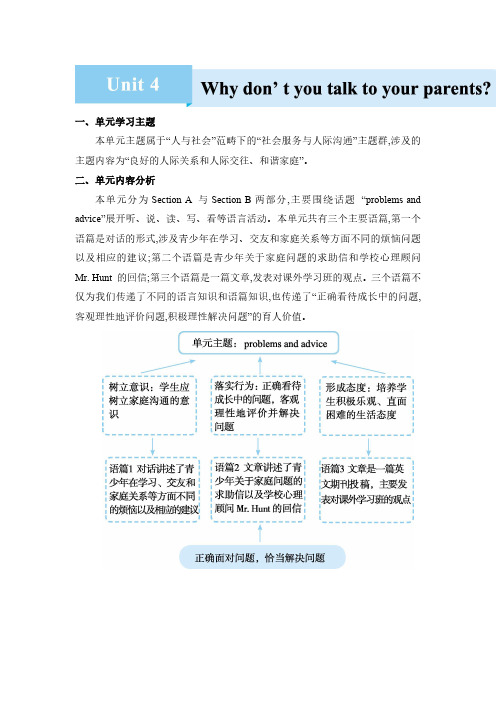
一、单元学习主题
本单元主题属于“人与社会”范畴下的“社会服务与人际沟通”主题群,涉及的主题内容为“良好的人际关系和人际交往、和谐家庭”。
二、单元内容分析
本单元分为Section A与Section B两部分,主要围绕话题“problems and advice”展开听、说、读、写、看等语言活动。
本单元共有三个主要语篇,第一个语篇是对话的形式,涉及青少年在学习、交友和家庭关系等方面不同的烦恼问题以及相应的建议;第二个语篇是青少年关于家庭问题的求助信和学校心理顾问Mr.Hunt的回信;第三个语篇是一篇文章,发表对课外学习班的观点。
三个语篇不仅为我们传递了不同的语言知识和语篇知识,也传递了“正确看待成长中的问题,客观理性地评价问题,积极理性解决问题”的育人价值。
人教版英语八年级下册教学大纲
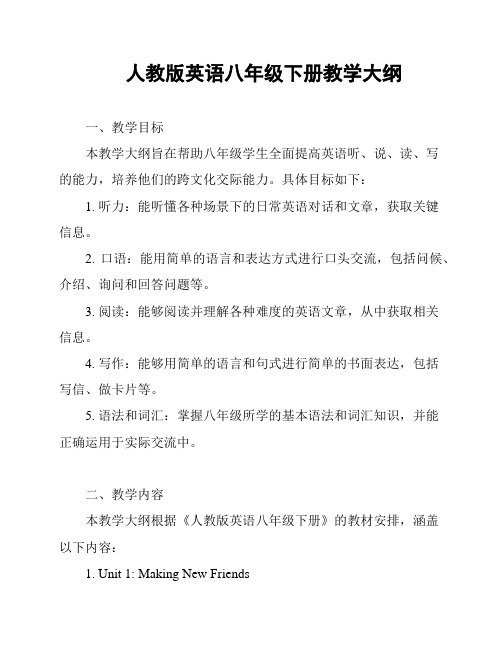
人教版英语八年级下册教学大纲一、教学目标本教学大纲旨在帮助八年级学生全面提高英语听、说、读、写的能力,培养他们的跨文化交际能力。
具体目标如下:1. 听力:能听懂各种场景下的日常英语对话和文章,获取关键信息。
2. 口语:能用简单的语言和表达方式进行口头交流,包括问候、介绍、询问和回答问题等。
3. 阅读:能够阅读并理解各种难度的英语文章,从中获取相关信息。
4. 写作:能够用简单的语言和句式进行简单的书面表达,包括写信、做卡片等。
5. 语法和词汇:掌握八年级所学的基本语法和词汇知识,并能正确运用于实际交流中。
二、教学内容本教学大纲根据《人教版英语八年级下册》的教材安排,涵盖以下内容:1. Unit 1: Making New Friends2. Unit 2: Stories of Myths3. Unit 3: It Was Really Late4. Unit 4: Reading in the Breeze5. Unit 5: The Great Sports Meet6. Unit 6: Life in the Future7. Unit 7: A Trip to Beijing8. Unit 8: Going to the Movies三、教学方法本课程注重学生的参与和互动,采用以下教学方法:1. 多媒体教学:使用PPT、视频等多媒体工具展示教材中的听力和阅读内容,激发学生的兴趣。
2. 小组合作:组织学生进行小组活动,进行口语交流和听说训练。
3. 角色扮演:通过角色扮演的方式让学生更好地理解和运用所学知识。
4. 游戏活动:引入游戏元素,增加研究的趣味性和互动性。
5. 课堂讨论:组织学生进行课堂讨论,激发他们的思维和创造力。
四、评估方式为了及时发现学生的研究情况和问题,本课程采用以下评估方式:1. 课堂表现:老师通过观察学生的课堂表现来评估他们的听、说、读、写能力。
2. 作业评价:定期布置作业,并对学生的作业进行评估和反馈。
人教版八年级下册英语教案道客巴巴
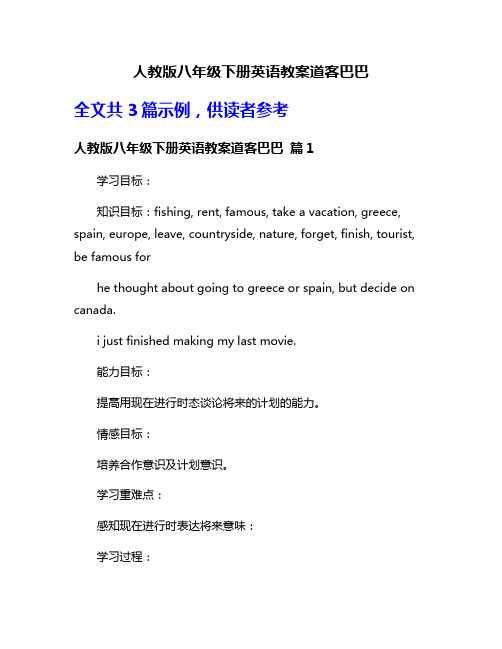
人教版八年级下册英语教案道客巴巴全文共3篇示例,供读者参考人教版八年级下册英语教案道客巴巴篇1学习目标:知识目标:fishing, rent, famous, take a vacation, greece, spain, europe, leave, countryside, nature, forget, finish, tourist, be famous forhe thought about going to greece or spain, but decide on canada.i just finished making my last movie.能力目标:提高用现在进行时态谈论将来的计划的能力。
情感目标:培养合作意识及计划意识。
学习重难点:感知现在进行时表达将来意味:学习过程:一、预习导学1.完成下列单词或短语。
___________观光;旅游___________著名的;出名的__________ 欧洲__________ 农村;乡村_____________大自然__________忘记________结束____________游客2.试译下列句子。
他原想去希腊或西班牙,但最后决定去加拿大。
____________________________________________________________________ ______.这次我想做些不同的事情。
_________________________________________________________________.我知道那儿有许多说法语的人。
_________________________________________________________________.二、自主学习1. leave动词,“离去;出发;忘带;把……留给;使……处于(某种)状态”。
如:he left home in a hurry.he left his son a lot of money when he died.please leave the door open.【归纳拓展】leave for 动身去……leave sb by oneself 把某人单独留下leave…behind 忘带;留下;把……落在后面【辨析活用】leave / forget两者都和“忘记”有关,但含义和用法有所不同。
人教版八年级英语下册集体备课教案:Unit4 Why don’t you talk to your

课题课时Period 1教学目标语言技能听:能听懂他人他人陈述困难和麻烦的简单对话的内容,并获取主要信息。
说:1.能询问、陈述自己或他人的困难和麻烦,如What’s wrong?I’m really tired because I studied until midnight last night.2.能针对别人的困境提出解决的办法和建议,如What should Ido?Well,you should call him so that you can say you’re sorry.语言知识语音:熟练把握邀请句的升调语调,同时,在口语交流时能做到语音、语调准确、自然、流畅。
词汇:1.熟练运用:allow,wrong,midnight,guess,de al.2.掌握:What’s wrong, look through,work out.语法:1.能正确使用情态动词could,should表达或劝告,如:Youcould go to his house.2.能正确使用Why don’t you...?句型表达建议。
功能:学会询问、陈述自己或他人的困难和麻烦。
话题:了解人际交往的相关知识。
情感态度1.培养学生用英语交际能力,学会与人进行流畅的沟通和交流;2.使学生在活动中学会真诚、坦然地与人交谈。
学习策略认知策略:能在具体的情境中询问、陈述自己或他人的困难和麻烦,从而进一步主动练习和实践。
调控策略:.能针对别人的困境提出解决的办法和建议,并与人进行交流。
交际策略:培养学生合作能力,不断完善知识点,加强对话练习,学会与人闲聊,进行交流。
资源策略:通过多媒体、录音机等教学辅助工具。
文化意识了解中西方家长对待孩子参加课外活动和课外学习班的态度与做法。
教学重难点教学重点1.能正确使用情态动词could,should表达或劝告。
2.能正确使用Why don’t you...?句型表达建议。
教学难点1.Talk about problems.2.Give advice.教学方法听说法,交际法,教学辅助手段PPT, recorder.板书设计Unit4 Why don’t you talk to your parents?Sectio n A 1a-2dallow What’s wrong?wrong Why don’t you...?midnightguessdeal教后反思本节课学会了提建议的方式有:Why don’t you...? /Why not…?等Teaching ProcedureStages/TimingStep 1. warming-upStep 2 PresentationStep3 DiscussionStep 4Pre sentationStep 5 ListeningTeach ers’ a ctivitiesAfter greeting, ask students :What day is it today?What’s the date today?What’s the weather like today?1. Show the picture of a girl:T: Please look at this girl,what isshe doing?T: Look at her face,she isworried.because she has a lotof homework to do.Do yo uhave too much homework todo?Do you think it is serious?1a.Get them to read the followingsentences and discuss wheatherthey are serious or not. And thenwrite them in the approprite boxT:Do you have theseproblems?What kind of problemsdo you have?Students’ activitiesStudents answer the questions。
(完整版)新人教版八年级下册英语全册教案
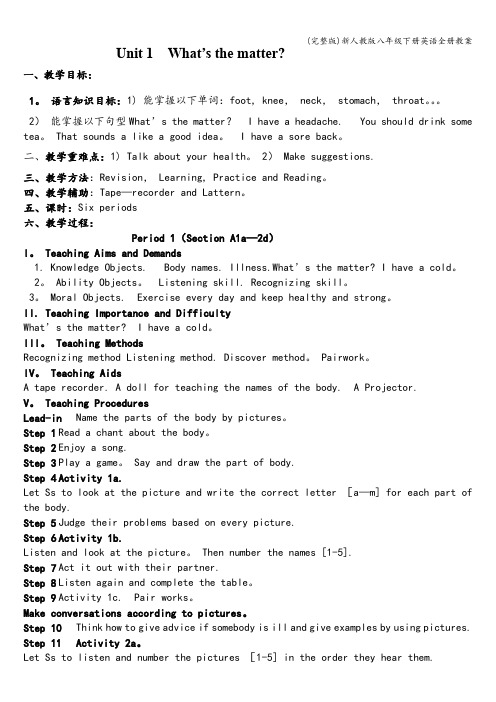
Unit 1 What’s the matter?一、教学目标:1。
语言知识目标:1) 能掌握以下单词:foot, knee, neck, stomach, throat。
2)能掌握以下句型What’s the matter? I have a headache. You should drink some tea。
That sounds a like a good idea。
I have a sore back。
二、教学重难点:1) Talk about your health。
2) Make suggestions.三、教学方法:Revision, Learning, Practice and Reading。
四、教学辅助:Tape—recorder and Lattern。
五、课时:Six periods六、教学过程:Period 1(Section A1a—2d)I。
Teaching Aims and Demands1. Knowledge Objects. Body names. Illness.What’s the matter? I have a cold。
2。
Ability Objects。
Listening skill. Recognizing skill。
3。
Moral Objects. Exercise every day and keep healthy and strong。
II. Teaching Importance and DifficultyWhat’s the matter? I have a cold。
III。
Teaching MethodsRecognizing method Listening method. Discover method。
Pairwork。
IV。
Teaching AidsA tape recorder. A doll for teaching the names of the body. A Projector.V。
新人教版八年级下册初中英语全册教案(教学设计)
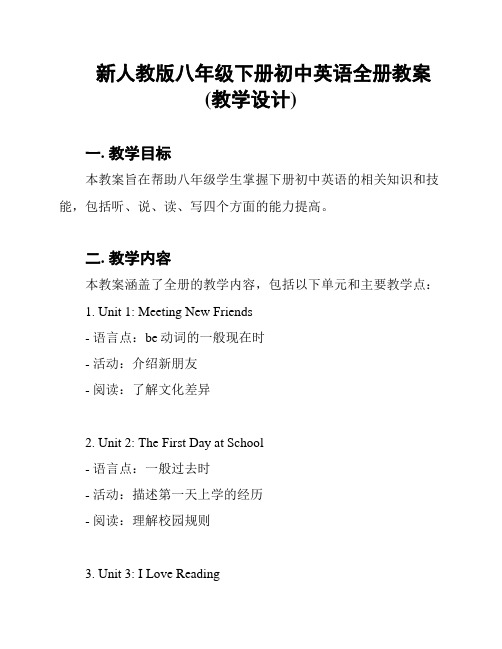
新人教版八年级下册初中英语全册教案(教学设计)一. 教学目标本教案旨在帮助八年级学生掌握下册初中英语的相关知识和技能,包括听、说、读、写四个方面的能力提高。
二. 教学内容本教案涵盖了全册的教学内容,包括以下单元和主要教学点:1. Unit 1: Meeting New Friends- 语言点:be动词的一般现在时- 活动:介绍新朋友- 阅读:了解文化差异2. Unit 2: The First Day at School- 语言点:一般过去时- 活动:描述第一天上学的经历- 阅读:理解校园规则3. Unit 3: I Love Reading- 语言点:情态动词can和must - 活动:介绍喜欢的书籍- 阅读:阅读理解4. Unit 4: My School Life- 语言点:形容词比较级和最高级- 活动:描述学校生活的不同方面- 阅读:了解不同的学校生活5. Unit 5: Our Future Jobs- 语言点:职业相关词汇- 活动:谈论未来的职业- 阅读:了解不同的职业6. Unit 6: Weather and Climate- 语言点:天气相关词汇和短语- 活动:讨论天气和气候- 阅读:了解不同地区的气候7. Unit 7: Enjoy Your Trip- 语言点:旅行相关词汇和短语- 活动:计划和描述旅行- 阅读:阅读旅行指南8. Unit 8: At the Farm- 语言点:动词的现在进行时- 活动:描述在农场的经历- 阅读:了解农场生活三. 教学方法本教案使用多种教学方法,包括但不限于:听力练、口语对话、阅读理解、小组讨论、写作练等。
教师将根据具体情况选择合适的教学方法进行教学。
四. 教学步骤1. 引入新课,激发学生兴趣。
2. 执行听力练以提高学生听力能力。
3. 进行口语对话练,帮助学生提高口语表达能力。
4. 进行阅读理解练,加深学生对课文的理解。
5. 进行小组讨论,让学生互相交流观点。
新人教版八年级下册英语全册教学教案
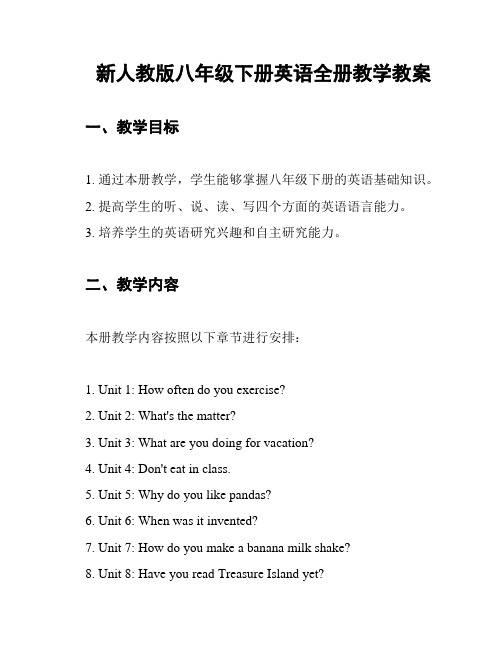
新人教版八年级下册英语全册教学教案一、教学目标1. 通过本册教学,学生能够掌握八年级下册的英语基础知识。
2. 提高学生的听、说、读、写四个方面的英语语言能力。
3. 培养学生的英语研究兴趣和自主研究能力。
二、教学内容本册教学内容按照以下章节进行安排:1. Unit 1: How often do you exercise?2. Unit 2: What's the matter?3. Unit 3: What are you doing for vacation?4. Unit 4: Don't eat in class.5. Unit 5: Why do you like pandas?6. Unit 6: When was it invented?7. Unit 7: How do you make a banana milk shake?8. Unit 8: Have you read Treasure Island yet?9. Unit 9: Have you ever been to a museum?三、教学方法1. 激发学生兴趣:通过多媒体教学手段,引导学生参与课堂活动,增加趣味性。
2. 合作研究:鼓励学生进行小组合作研究,提高互动和合作能力。
3. 情景教学法:通过情景模拟和角色扮演,帮助学生理解和运用英语知识。
4. 多样化评价:采用各种形式的评价方法,如口头表达、书面作业、小组项目等,全面评估学生的英语能力。
四、教学重点1. 掌握本册教材中的基础词汇和句型。
2. 培养学生的听力和口语表达能力。
3. 提高学生的阅读和写作能力。
五、教学资源1. 电子版教材:提供学生课本的电子版,方便学生课后复和自主研究。
2. 多媒体设备:使用投影仪和音响设备进行多媒体教学。
3. 教学参考书:教师将选取合适的参考书籍和教辅资料,辅助教学。
六、教学安排根据教学进度和学生需求,每个单元的教学安排如下:Unit 1: How often do you exercise?- 介绍课文内容及目标词汇和句型。
人教版八年级下册英语教案(全册)
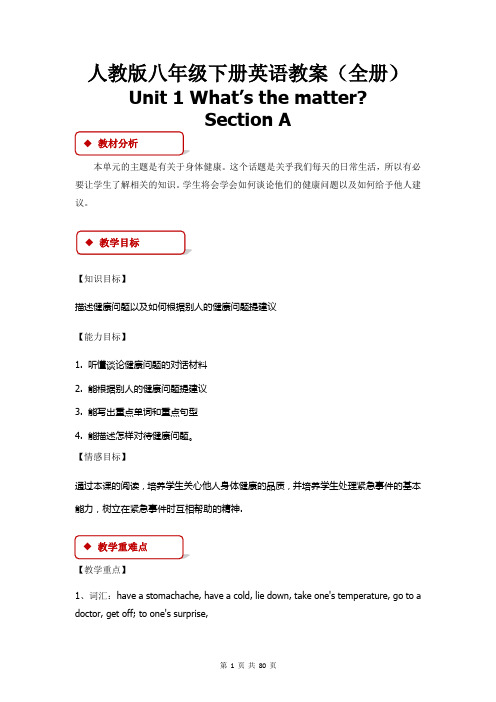
人教版八年级下册英语教案(全册)Unit 1 What’s the matter?Section A◆教材分析本单元的主题是有关于身体健康。
这个话题是关乎我们每天的日常生活,所以有必要让学生了解相关的知识。
学生将会学会如何谈论他们的健康问题以及如何给予他人建议。
◆教学目标【知识目标】描述健康问题以及如何根据别人的健康问题提建议【能力目标】1.听懂谈论健康问题的对话材料2.能根据别人的健康问题提建议3.能写出重点单词和重点句型4.能描述怎样对待健康问题。
【情感目标】通过本课的阅读,培养学生关心他人身体健康的品质,并培养学生处理紧急事件的基本能力,树立在紧急事件时互相帮助的精神.◆教学重难点◆【教学重点】1、词汇:have a stomachache, have a cold, lie down, take one's temperature, go to a doctor, get off; to one's surprise,2、句型:1. ——What's the matter?——I have a stomachache. You shouldn't eat so much next time.2 . ——What's the matter with Ben?——He hurt himself. He has a sore back.——He should lie down and rest.【教学难点】掌握情态动词should shouldn't.的用法;学习have的用法◆课前准备◆Multimedia, group work, cooperative discussion.◆教学过程Step1. Warm up1. Look at the picture and learn the parts of the body.2. New words and phrases.Step 2 Presentation1. 1aLook at the picture. Write the correct letter [a-m] for each part of the body. Then check the answers.2. 1bFirst, lead Ss to read the five names.Then look at the picture. Number the names 1-5.Finally, check the answers.3. 1cDivide two Ss into a pair to make conversations. Finally, invite several pairs to act out for the class.Step 3 Practice1. 2aTell Ss there are five conversations. In each conversation the person says what’s going on with them. Listen carefully and number the pictures.Play the tape. Then check the answers.2. 2bAsk Ss to listen to the recording again to match the problems with the advice.Play the recording again. Then check the answers.3. 2cAsk Ss to make conversations using the information in 2a and2b. Give them enough time to do this task. Later, invite several pairs to present their conversations to the class.Step 4 Consolidation1. 2dFirst, ask Ss to have a fast reading of the conversation to get the main idea.Then, lead Ss to read the conversation sentence by sentence, explain some language points.Finally, divide Ss into pairs to practice role-playing the conversation.2. 3aFirst, read the passage quickly and answer the question.Then, lead Ss to read the passage and analyse the key points.Finally, read together.3. 3bRead the passage again and check the things that happened in the story3cDiscuss the questions with a partner.4. Grammar focusFirst, lead Ss to read the sentences.Then, prompt Ss to analyse the use of model verb should.After that, explain the grammar together.5. 4aAsk Ss to fill in the blanks.Then , invite some Ss to present their answers.6. 4bAsk Ss to circle the best advice for these health problems, then add their own advice.After that, invite some Ss to present their advice.7. 4cOne student mimes a problem. The other students in your group guess the problem and give advice.Step 5 Language pointsStep 6 HomeworkMake a conversation about health problems and giving advice.Unit 1 What’s the matter?Section B◆教材分析本单元的主题是有关于身体健康。
新人教版八年级下册英语教案

新人教版八年级下册英语教案一份优秀的英语教案是八年级英语教师上好一堂课的保障。
下面是小编为大家精心整理的新人教版八年级下册英语的教案,仅供参考。
新人教版八年级下册英语教案(一)Section B 1a-2e教学目标一、知识与技能1. 掌握新单词和短语。
2. 在不同的情境中正确、熟练地使用表示委婉请求的句型。
3. 培养听、说、读、写四项基本技能。
二、过程与方法观看,感受,模仿,实践。
三、情感态度与价值观认识到不仅在家庭中,在生活中的其他情况我们也要积极参加,勇于实践。
教学重点在不同的情境中正确、熟练地使用表示委婉请求的句型。
教学难点培养听、说、读、写四项基本技能。
教法导航创设情境,实践演练。
学法导航通过听说读写,独立思考,小组合作完成学习任务,提高各项能力。
教学准备图片,多媒体。
新人教版八年级下册英语教案(二)教学过程Step 1 GreetingsGreet the students as usual.Step 2 PreparationT:When I was a teenager,my parents often asked me to clean my room. Sometimes they asked me to buy some things. Now I often ask my daughter to take out the trash. What chores do your parents usually ask you to do?S1:My mother usually asks me to buy some food.S2:My mother often asks me to make my bed.S3:My father always asks me to clean my bike.S4:They ask me to clean my bedroom.T: Do you ask your parents to do anything? What do you ask them to do?S1:I ask my mother to make bed for me.S2:I ask my father to buy some books for me....Step 3 PracticeT:Look at the items in 1a,Section B. What can teenagers ask their parents to do? Whatdo parents ask their teenagers to do? Write “parents” or “teenagers” next to each phrase.Ask students to go through the phrases first. Give some explanations about the key words.teenager:someone who is between 13 and 19 years oldsnack:something eaten between mealsborrow:borrow sth from sblend:lend sth to sb/lend sb sthinvite:invite sb to sth (a wedding,party,meal,etc.) ; invite sb to do sthThen check their answers.Step 4 Pair workLet students use the phrases in activity 1a to make conversations between parents and teenagers. First,get a pair of students to read the sample conversations. Then students make their own conversations.Step 5 Listening1c, T:Now listen to the conversation between Sandy and her mom. Please check each item in activity 1a they talk about. Put a check mark in front of each phrase you hear.Play the recording,students only listen.Play the recording a second time. Students listen and check the items.Check the answers with the whole class.1d, T:From the conversation,we know Sandy will hold a party. She will invite some friends to the party. But she needs to do some preparation. She asks her mom to help her. And Dave is one of Sandy’s friends. He will also help Sandy do the preparation. So what is Sandy’s mom going to do? What is Sandy going to do? What are Sandy and Dave going to do? Let’s listen again and fill in the chart in activity 1b.Play the recording a third time. Ask students to write down the things the three people are going to do. Pause the tape where necessary. Then check the answers.Step 6 Pair work1e T:Suppose you are having a party. Make a list of things you need to do. Some things are already given. Write more things you need to do. Get students work in pairs and add more things to the list. For example:buy some CDs,decorate the walls,make some gifts ...T:Now make conversations and ask your partner to do some of the things for you. Then ask some pairs to demonstratetheir conversations.Step 7 DiscussionSay:Doing chores has advantages and disadvantages. What’s your opinion? Ask some students to report their opinion. Then say:Suppose you are Ms. Miller or Mr. Smith,after reading the two letters,work in groups and discuss the advantages and disadvantages of doing chores. After a few minutes,ask some groups to report their opinions.Step 8 ReadingSay:Read the letters again and try to find out the phrases in 2d. Ask some students totranslate the phrases first and then ask them to work in pairs to write one sentence with each phrase from the letters. Then ask some students to report their sentences.Step 9 Homework1. Finish the chart in 2c according to Ms. Miller and Mr. Smith.2. Discuss the questions in 2e with a partner.新人教版八年级下册英语教案(三)课堂作业I. Match the sentences( )1. Could I speak to Sam,please?( )2. Would you like to come to my birthday party tonight?( )3. May I come in?( )4. What about going out for a walk?( )5. Shall I open the door?( )6. Will you (please) lend your pen to me?a. Good idea!b. Yes,please.c. Certainly. Hold on,please.d. I’d love to.e. Sorry,I’m afraid not.f. Come in,please.II. Translate the sentences into English.1. 你能接一下电话吗?______________________________________2. 你能把书带到教室里去吗?______________________________________3. 你能帮我打扫房间吗?______________________________________4. 我能打开窗户吗?______________________________________5. 我可以借你的车吗?______________________________________参考答案:I. c d f a b e II. 1. Could you answer the phone? 2. Could you take the book to the classroom? 3. Could you help me clean the room? 4. Could I open the window? 5. Could I borrow your car?教学反思教师在开展教学活动时,个别小组出现“冷清”的场面,这些学生只顾自己独立思考,停留在独立学习的层次上,没有发挥合作学习的优势,使合作流于形式。
人教版八年级下册英语教案道客巴巴
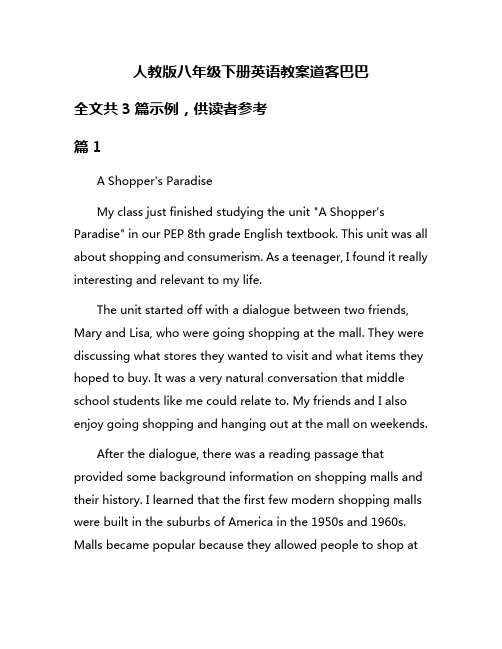
人教版八年级下册英语教案道客巴巴全文共3篇示例,供读者参考篇1A Shopper's ParadiseMy class just finished studying the unit "A Shopper's Paradise" in our PEP 8th grade English textbook. This unit was all about shopping and consumerism. As a teenager, I found it really interesting and relevant to my life.The unit started off with a dialogue between two friends, Mary and Lisa, who were going shopping at the mall. They were discussing what stores they wanted to visit and what items they hoped to buy. It was a very natural conversation that middle school students like me could relate to. My friends and I also enjoy going shopping and hanging out at the mall on weekends.After the dialogue, there was a reading passage that provided some background information on shopping malls and their history. I learned that the first few modern shopping malls were built in the suburbs of America in the 1950s and 1960s. Malls became popular because they allowed people to shop atmany different stores under one roof. They were protected from the weather and had amenities like food courts.As the reading passage described, malls offered a variety of shops selling clothes, shoes, accessories, electronics, sporting goods, books, toys, and more. Huge department stores often anchored the malls at either end. Walking through a big mall, you could find everything you needed all in one place. No wonder they were called "shoppers' paradises"!The passage also discussed some of the criticism around malls and excessive consumerism. It mentioned issues like traffic congestion, pollution from cars, destroying natural habitats to build malls, and encouraging people to spend beyond their means. However, it presented both sides in a balanced way.After reading and discussing the background information, we practiced various language skills related to shopping and spending money. This included lots of new vocabulary words like "bargain," "clearance," "splurge," "impulse buy," "window shopping," and more. We learned how to ask about prices, negotiating, and politely make requests at stores.There were also grammatical exercises on topics like forming plurals for different categories of merchandise. For example, we had to distinguish between singular and plural forms like "a pairof jeans" versus "two pairs of jeans." It was tricky but good practice.My favorite part was the role-play activities where we got to act out being shoppers and clerks at different types of stores. Getting into character and using the newly learnedwords/phrases made it much more engaging than just doing bookwork. I played the part of a sales associate at a clothing boutique trying to convince my friend to buy an overpriced handbag. It was fun!The unit culminated with a writing assignment where we had to describe our dream shopping mall and analyze the pros and cons of malls. I enjoyed flexing my creativity and argumentative skills for this essay. I designed my fantasy mall to have cool tech features like hologram assistants to help guide shoppers. But I also acknowledged some of the environmental downsides.Overall, I felt this was one of the most useful, practical units we've studied so far. As teenagers, my classmates and I are starting to shop independently and make decisions on how to spend our money. The skills we learned about budgeting, discounts, returns/exchanges, and responsible consumption will definitely come in handy. While it's fun to go on shoppingsplurges sometimes, this unit taught me the importance of being a smart, conscientious consumer.篇2The Guest is GodHave you ever heard the famous saying "The guest is God"? It's an Indian proverb that means you should treat your guests with the utmost respect and hospitality. This proverb is the central theme of the lesson "道客巴巴(The Guest is God)" in our 8th grade English textbook.The story is set in a small Indian village and follows a poor farmer named Sudama who used to be a childhood friend of Lord Krishna. Despite his humble circumstances, Sudama decides to visit the wealthy Lord Krishna who now lives in a grand palace. His wife is skeptical about the idea, questioning what kind of gift they could possibly bring that would be worthy of a king. But Sudama insists that the most valuable thing is the love and affection between old friends.With just a few handfuls of rice as a token gift, wrapped in an old cloth, Sudama sets off on the long journey to Krishna's palace. When he arrives, the guards initially turn him away, mocking his simple appearance. But Lord Krishna immediatelyrecognizes his childhood friend and rushes out to greet him with great joy and affection.Krishna embraces the poor Sudama warmly and ushers him inside with honor. Despite Sudama's embarrassment over his humble gift, Krishna accepts it as if it were the most precious offering. He treats his old friend as an honored guest, seating him comfortably and personally serving him delicious food and refreshments.As their reunion continues, Sudama starts to feelself-conscious about his poverty compared to Krishna's immense wealth and power as a king. But Krishna sees into his heart and reminds him that true friendship is beyond any materialistic concerns. Their bond is strong because it was formed in their innocent childhood days through sincere care and love for each other.In the end, when it is time for Sudama to depart, Krishna overwhelms him with abundant riches and treasures as a farewell gift. Sudama is reluctant to accept such valuable items, but Krishna insists, saying that he cherishes their friendship far more than any worldly riches. He asks only that Sudama returns home in peace and continues to regard him as a true friend for life.The story of the unshakable friendship between Lord Krishna and the humble Sudama drives home the moral of showing utmost respect, generosity and kindness to one's guests, no matter their social status. It teaches that the purest love stems from the depths of the human heart, not from materialistic considerations.From this lesson, I have learned the great significance of the Indian cultural value summed up in "The Guest is God." Even someone as powerful and wealthy as Lord Krishna honored his childhood friend Sudama and treated him as an esteemed guest deserving of the highest hospitality and warmth.The story has inspired me to be more welcoming, kind and generous towards any guests who may visit my home, regardless of their background or social standing. Like Krishna, I will aim to look beyond the surface and connect with the human essence of each guest through an open heart and sincere gestures of friendship.At the same time, I have also realized the reciprocal importance of being a gracious and humble guest myself when visiting others. Just as Sudama did not expect any grand reception despite Krishna's immense wealth, I too should not judge my hosts solely based on material factors. Instead, I shouldcherish the warmth of their hospitality and focus on upholding the human bonds of care and affection.The Indian ethos of "Atithi Devo Bhava" or "The Guest is God" is a profound philosophy that can help create a more compassionate and respectful world. By transcending superficial differences and nurturing the core human values of friendship, kindness and hospitality, we can strengthen the bonds that unite all people across all backgrounds and identities.In today's fast-paced world with its fair share of conflicts and divisions, this ancient wisdom of reverence for guests serves as a timeless reminder. It inspires us to slow down, disconnect from material pursuits, and reconnect with the inherent dignity and divinity within every human soul that arrives at our doorstep. I am grateful to have learned this lesson at a young age through our English textbook stories.篇3Dockaberra - An Imaginary World of WonderHey guys! Today I want to share my thoughts on the awesome lesson we just did in English class called "Dockaberra".I have to say, this was hands down one of the most fun andimaginative units we've covered so far this year. Let me tell you all about the wild and wacky world of Dockaberra!So Dockaberra is this make-believe place that our textbook describes. From what I understand, it's meant to be like a utopian society where everything is perfect and everyone is happy. The name "Dockaberra" itself is kind of a play on words combining "dock" (since it's an island) and "Canberra" which is the capital of Australia. Clever, right?The place is depicted as a remote island out in the middle of the ocean, untouched by the modern world. There are no factories or pollution, just pure natural beauty. The islanders live really simple lives as farmers and fishermen, growing their own crops and catching fish from the crystal blue waters. It's supposed to be like a paradise on Earth!One of the coolest things about Dockaberra is the way they make decisions. Instead of having one ruler or leader calling all the shots, they practice true democracy. Everyone has an equal say and they vote on every single decision that affects the community - how awesome is that? No parents, teachers or bosses telling you what to do, haha!From what the book describes, the islanders only work a few hours per day, with the rest of their time devoted to leisureactivities, sports, and cultural events. They have art festivals, music performances, athletic competitions - it sounds like an absolute blast. Sign me up to move there!Honestly though, my favorite part has to be their bizarre traditions and customs. For example, Dockaberra has this "Courtesy Custom" where you're supposed to mix up parts of common polite phrases. So instead of saying "Thank you very much" you'd say "Much thanks a lot". Or "Very nice to meet you" becomes "Meet you very nice". So weird but kind of hilarious!Then there's the whole concept of "Ramon Lists". Basically, the islanders make lists for every possible scenario or life event you can imagine. Need to pack for a trip? Consult the Ramon List on what to bring. Want to learn proper party etiquette? There's a Ramon List for that too. From the mundane to the extraordinary, they've got it all covered in list form!I could honestly go on and on about the quirky rituals and daily routines described in this lesson. The。
- 1、下载文档前请自行甄别文档内容的完整性,平台不提供额外的编辑、内容补充、找答案等附加服务。
- 2、"仅部分预览"的文档,不可在线预览部分如存在完整性等问题,可反馈申请退款(可完整预览的文档不适用该条件!)。
- 3、如文档侵犯您的权益,请联系客服反馈,我们会尽快为您处理(人工客服工作时间:9:00-18:30)。
Unit 1 will people have robots ? Teaching goals:1. Words&phrases: robot, paper, less, fewer, simple, unpleasant,factory, seem, etc .2. will 构成的一般将来时态的陈述句、否定句、疑问句及回答.3. There be 句型的一般将来时.4. more , less , fewer 的用法.5. 学习一般将来时态的相关知识,学会对未来进行预测.6. 对five years ago ,today ,in five years 简洁回顾与展望的方式,贴近实际符合学生心理,激发学习兴趣.7. 通过时间对比复习一般过去时态、一般现在时态,巩固一般将来时.Important and difficult points :1. will 构成一般将来时态的句式。
2. There be 句型的一般将来时态。
3. more , fewer , less 的用法。
4. How to make predictions .Period 1Teaching procedures:Step 1 Leading in1. Greetings: Welcome to school .What’s the date today ? Who’s on duty today ?2Do you enjoy your winter holiday ?Do you finish your homework ?Do you want to live on the moon ?Can you guess what will happen in ten years ?Collect the Ss’ answers and say something about their predictions .Step 2 Pre-taskSB Page 2 ,1a .1. Look at the picture :How will the world be different in the future ,100 years from now ?We’re going to talk about sth in 100 years .2. Read each predictions to the class .Explain the new vocabulary .3. Read the instructions .Make sure Ss know what they should do .4. Do it by themselves .5. Talk about the answers with the class .Explain :一般将来时态构成: will / be going to +动词原形Step 3 While-taskSB Page 2 ,1b .1. Practise reading the six predictions .2. Read the instructions to Ss .Circle the things you hear on therecording .3. Play the tape twice .4. Play the tape a third time .At the same time ,check the answers .SB Page 2 , 1c .1. Pay attention to the dialogues .2. Read the dialogues fluently .3. Pairwork .Work in pairs to make predictions according to the sample .4. Ask several pairs to share their conversations to the class . SB Page 3 , 2a & 2b .1. Read the predictions .2. Read the instructions and point out the sample answer .3. Play the tape twice .Ss circle the word they hear in each sentences: more , less , fewer .4. Check the answers .学生探究: less , fewer 的区别。
Step 4 Post-task31. Point to the example in the sample dialogue .Practice reading .2. Look at activity 2b .Groupwork:Take turns to make conversations about the predictions .Grammar Focus:1. Review the grammar box .Ss say the statements and responses .2. Make summaries about “will” ,“fewer” and “less” . Homework:1. Make predictions about yourself in 10 years .Write down 5 sentences .2. Go over the new words .教学后记:Period 2Teaching procedures :Step 1 Leading in1. Greetings and free talk .2. Check their homework :Ask two or three Ss to speak out what they wrote down .(教师作出适当的评价)Step 2 Pre-task1. Go over what we learnt yesterday .2. 通过三种时间的对比简略复习一般过去时与一般现在时。
Step 3 While-taskSB Page 4 , 3a .1. Point to the three picture and say :This is Sally .The first pictureis Sally five years ago ,the second one is Sally now ,and the third one is Sally five years in the future .2. Read the instructions .3. Complete filling in the blanks individually .4. Check the answers .5. Practise reading .Then ask some Ss read them out .4SB Page 4 , 3b .1. Look at activity 3a .Make predictions about Sally .2. Point to the example in the sample dialogue .Ask two Ss to readthe dialogue to the class .3. Practise reading .4. Pairwork .Make their predictions about Sally .Step 4 Post-task1. Write about yourself .With the help of the sample of Sally .We can write sth about ourselves five years ago ,today and in five years .2. Complete the work individually .3. Review the task .Ask a few more Ss for answers . Homework :Draw a picture of the city in 20 years .Describe it to the class . 教学后记:Period 3Teaching procedures :Step 1 Leading in1. Greetings .2. Say yourselves :five years ago , today and in five years .3. Check the homework.Step 2 Pre-taskSB Page 5 , 1a .1. Look at the form and read the headings to the class .Make surethe Ss know what they mean .2. Read the list of seven words .Explain the new words .3. Write each word in the correct column .Check the answers. SB Page 5 , 1b .1. Read the words already written on the chart .2. Groupwork: Think about what we learned before .Write some 5words in the chart above .Divide the class into groups of four ,let them have a competition .Step 3 While-taskSB Page 5 , 2a .1. Look at the pictures carefully .Can you guess what we’ll listen ?Talk about them .2. Read the instructions .We’ll listen to 3conversations .Numberthe pictures 1-3 .3. Play the tape twice .Check the answers .SB Page 5 , 2b .This activity is easy ,I think .For we know the conversations aretalking about Alexis 10 years ago ,today and in 10 years .1. Read the instructions .2. Pay attention to the sentences and the verbs in the box .3. Play the tape and correct the answers .Step 4 Post-task1. Read the instructions .2. Pairwork. One is Alexis, one is Joe .3. Point out the example in the sample dialogue .Read it to the Ss .4. Talk about Joe’s life now , ten years ago and in ten years .5. Ask some pairs of Ss to say their dialogues . Homework:1. Go over the words .2. 写一篇50 个单词左右的小短文,预测与展望未来我们的学习和生活。
